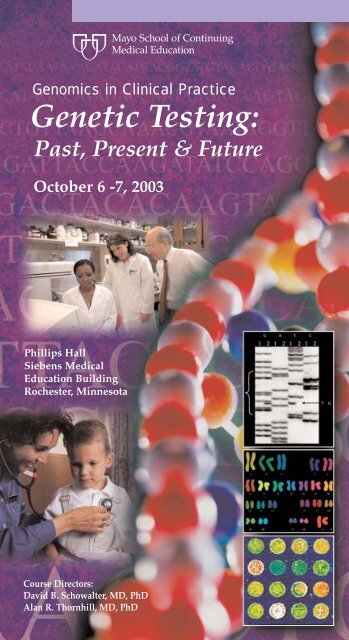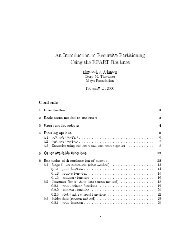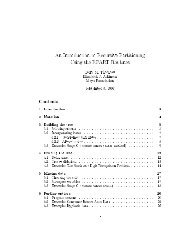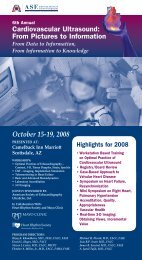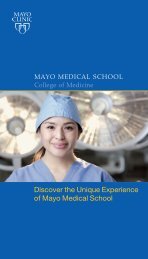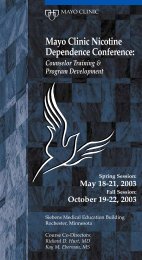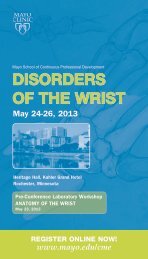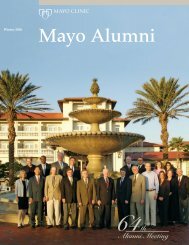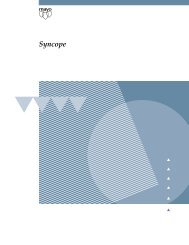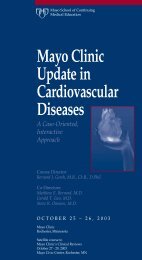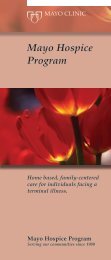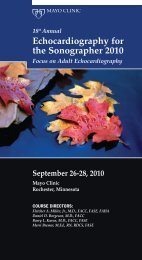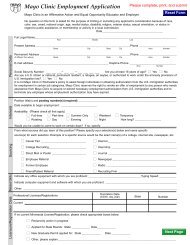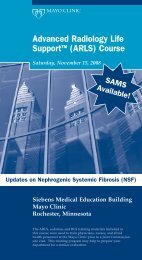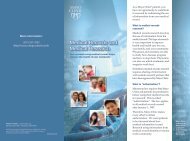Genetic Testing - Mayo Clinic
Genetic Testing - Mayo Clinic
Genetic Testing - Mayo Clinic
You also want an ePaper? Increase the reach of your titles
YUMPU automatically turns print PDFs into web optimized ePapers that Google loves.
Genomics in <strong>Clinic</strong>al Practice<br />
<strong>Genetic</strong> <strong>Testing</strong>:<br />
Past, Present & Future<br />
October 6 -7, 2003<br />
Phillips Hall<br />
Siebens Medical<br />
Education Building<br />
Rochester, Minnesota<br />
Course Directors:<br />
David B. Schowalter, MD, PhD<br />
Alan R. Thornhill, MD, PhD
General Information<br />
COURSE DESCRIPTION<br />
Genomics in <strong>Clinic</strong>al Practice - <strong>Genetic</strong> <strong>Testing</strong>: Past, Present and Future will provide<br />
healthcare providers from all medical specialties with an overview of all aspects of<br />
genetic testing. In-depth didactic lectures given by experts in each field will cover the<br />
core knowledge areas in medical genomics (with an emphasis on genetic testing). During<br />
the afternoon of the first day there will be special sessions utilizing innovative learning<br />
techniques. These sessions will include one-on-one experiential learning of genetic<br />
counseling and informal question and answer sessions using an interactive audience<br />
response system with real case examples. The first day will conclude with a performance<br />
of the thought-provoking play “The Gift” by Joanna Baldwin. This play deals with the<br />
ethical, legal and societal issues raised by the discovery of genetic disease (Friedrich’s<br />
ataxia) within a family. Delegates are encouraged to participate in an open discussion<br />
between the audience, the cast and an expert panel following the presentation. Lectures<br />
on the second day will focus on the future of genetic testing in medicine. During lunch<br />
on the second day, facilitators will share results of real-time genetic tests performed on<br />
samples from participating delegates. This lunch will end the formal meeting. During the<br />
afternoon of the second day, delegates are invited to attend a series of presentations by<br />
Dr Eric Wieben and colleagues designed to highlight the <strong>Mayo</strong> <strong>Clinic</strong> Genomic Research<br />
Center’s efforts to implement the promise of the genomics revolution. Initiatives in<br />
genomics research, bioinformatics, data warehousing, genomics education and<br />
population-based DNA/tissue banking will be presented.<br />
COURSE OBJECTIVES<br />
At the conclusion of this course, the participant should be able to:<br />
• Distinguish between different genetic /epigenetic alterations that cause disease<br />
• Explain the concept of the genome, transcriptome and proteome<br />
• Compare the strengths and weaknesses of different laboratory methodologies used to<br />
perform genetic tests<br />
• Differentiate between diagnostic and predictive genetic testing<br />
• Distinguish between research and clinical genetic tests<br />
• Assess genetic risk in the absence of genetic testing<br />
• Identify ethical, legal and social concerns with genetic tests<br />
• Compare federal and state-specific laws regarding the use of genetic information<br />
• Integrate genetic awareness in all clinical specialties<br />
INTENDED AUDIENCE<br />
This course is designed for healthcare providers from all medical specialties with a<br />
strong interest in genomics and a basic understanding of genetics and will provide many<br />
practical examples of the impact of the genomic revolution on a range of medical specialties.<br />
DATE AND LOCATION<br />
The Genomics in <strong>Clinic</strong>al Practice – <strong>Genetic</strong> <strong>Testing</strong>: Past, Present and Future course will<br />
be held October 6 – 7, 2003. Course headquarters will be located at Phillips Hall on the<br />
first floor of the Siebens Medical Education Building, <strong>Mayo</strong> <strong>Clinic</strong>, 100 Second Avenue<br />
Southwest, Rochester, Minnesota. Meeting facilities are easily accessible by skyway and<br />
pedestrian subway, which connect <strong>Mayo</strong> <strong>Clinic</strong> to shops, restaurants, and hotels.<br />
Presented by:<br />
<strong>Mayo</strong>/George M. Eisenberg Genomics Education Program, <strong>Mayo</strong> <strong>Clinic</strong><br />
Supported in part by the George M. Eisenberg Foundation for Charities, Chicago, IL
CREDIT<br />
<strong>Mayo</strong> Foundation is accredited by the Accreditation Council for Continuing Medical<br />
Education (ACCME) to provide continuing medical education for physicians.<br />
<strong>Mayo</strong> Foundation designates this educational activity for a maximum of 14.25 category 1<br />
credits towards the AMA Physician’s Recognition Award. Each physician should claim<br />
only those credits that he/she actually spent in the educational activity.<br />
Other health care professionals will be provided a certificate of attendance for requesting<br />
credits in accordance with state nursing boards, specialty societies, or other professional<br />
associations.<br />
REGISTRATION<br />
To register, complete the attached registration form and return by mail or fax. The<br />
registration fee includes tuition, comprehensive course syllabus, continental breakfast,<br />
break refreshments, luncheon on Monday and Tuesday and dinner Monday evening.<br />
Although it is not the policy of <strong>Mayo</strong> <strong>Clinic</strong> to limit the number of registrations for a<br />
course, conference room facilities may necessitate closing of enrollment; therefore, early<br />
registration is strongly advised. A letter of confirmation will be sent upon receipt of<br />
payment and completed registration form. Please present this letter when checking in at<br />
the meeting registration desk.<br />
CANCELLATION POLICY<br />
Your registration fee, less a $50 administrative fee, will be refunded when written<br />
notification is received by the <strong>Mayo</strong> School of Continuing Medical Education before<br />
September 22, 2003. No refunds will be made after September 22, 2003.<br />
LODGING ACCOMMODATIONS<br />
Blocks of guestrooms have been reserved with special course rates at each of the following<br />
downtown Rochester hotels. To ensure accommodations and the discounted rate, please<br />
make your reservations by September 15, 2003 and identify yourself as a participant of<br />
the course, Genomics in <strong>Clinic</strong>al Practice – <strong>Genetic</strong> <strong>Testing</strong>: Past, Present and Future.<br />
Hilton Garden Inn<br />
Kahler Grand Hotel<br />
225 South Broadway 20 Second Avenue SW<br />
800-445-8667 or 507-285-1234 800-533-1655 or 507-282-2581<br />
$89 single/double $79 single/double<br />
Radisson Plaza Hotel<br />
Rochester Marriott Hotel<br />
150 South Broadway 101 First Avenue SW<br />
800-333-3333 or 507-281-8000 877-623-7775 or 507-280-6000<br />
$95 single/double $129 single/double<br />
Skyway and pedestrian subway to conference facilities, downtown shops, restaurants<br />
and theaters connect the hotels listed above. You may also wish to visit the Rochester<br />
Convention and Visitors Bureau website (www.rochestercvb.org) for additional<br />
accommodation options.
TRAVEL<br />
Rochester, Minnesota, is a friendly city that greets thousands of visitors from around the<br />
world each year. The city is serviced by a modern international airport with multiple<br />
flights daily from Chicago and Minneapolis via American or Northwest Airlines. Access<br />
to and from the airport is provided by taxi cab and shuttle service. The airport is located<br />
approximately 10 driving miles from the <strong>Mayo</strong> <strong>Clinic</strong> complex.<br />
PARKING<br />
Parking is available in hotel, city, and <strong>Mayo</strong> patient/visitor ramps. The cost for parking<br />
is not included in the registration fee. A map indicating the location of downtown<br />
parking facilities will be mailed with the registrant confirmation letter.<br />
FACULTY<br />
<strong>Mayo</strong> Faculty<br />
Michael J. Ackerman, M.D.,Ph.D., Department of<br />
Pediatric and Adolescent Medicine, Division of<br />
Cardiovascular Research<br />
Mark E. Bolander, M.D., Department of Orthopedic<br />
Surgery, Division of Orthopedics Research*<br />
David J. Brandhagen, M.D., Division of<br />
Gastroenterology and Hepatology, Department<br />
of Internal Medicine<br />
John E. Carpenter, Ph.D., Department of<br />
Biochemistry and Molecular Biology<br />
Piet C. de Groen, M.D., Division of<br />
Gastroenterology and Hepatology, Department<br />
of Internal Medicine<br />
Gordon W. Dewald, Ph.D., Department of<br />
Laboratory Medicine and Pathology; Division<br />
of Laboratory <strong>Genetic</strong>s; Director, Cytogenetics<br />
Laboratory*<br />
Jay W. Ellison, M.D., Ph.D., Department of Medical<br />
<strong>Genetic</strong>s*<br />
Sherine E. Gabriel, M.D., Department of Health<br />
Sciences Research, Division of Epidemiology<br />
W. Edward Highsmith, Jr., Ph.D., Department of<br />
Laboratory Medicine and Pathology, Division of<br />
Laboratory <strong>Genetic</strong>s;<br />
C. Christopher Hook, M.D., Division of Hematology;<br />
Chair, <strong>Mayo</strong> <strong>Clinic</strong> Ethics Council<br />
Noralane M. Lindor, M.D., Department of Medical<br />
<strong>Genetic</strong>s<br />
Pamela S. McGrann, M.D., Department of Medical<br />
<strong>Genetic</strong>s<br />
David C. Muddiman, Ph.D., Department of<br />
Biochemistry and Molecular Biology<br />
Dennis J. O’Kane, Ph.D., Department of Laboratory<br />
Medicine and Pathology; Director, Core<br />
Laboratory for Assay<br />
Signal Systems<br />
Gloria M. Petersen, Ph.D., Department of Health<br />
Sciences Research, Division of Epidemiology*<br />
David B. Schowalter, M.D., Ph.D., Department of<br />
Medical <strong>Genetic</strong>s*<br />
Thomas C. Spelsberg, Ph.D., Department of<br />
Biochemistry and Molecular Biology, Chair,<br />
Genomics Education Program*<br />
Ayalew Tefferi, M.D., Division of Hematology,<br />
Department of Medicine*<br />
Terry M. Therneau, Ph.D., Department of Health<br />
Sciences Research, Division of Biostatistics<br />
Alan R. Thornhill, Ph.D., Section of Reproductive<br />
Endocrinology and Infertility, Department of<br />
Obstetrics and Gynecology*<br />
Trudy N. Trysla, J.D., Legal Department<br />
Richard M. Weinshilboum M.D., Division of<br />
Molecular Pharmacology and Experimental<br />
Therapeutics, Department of Medicine<br />
Eric D. Wieben, Ph.D., Department of Biochemistry<br />
and Molecular Biology; Director Genomics<br />
Research Center*<br />
John M. Wilkinson, M.D., Department of Family<br />
Medicine*<br />
Lester E. Wold, M.D., Department of Laboratory<br />
Medicine and Pathology; Medical Director,<br />
<strong>Mayo</strong> Collaborative Services, Inc.<br />
*Members of the Genomics Education Steering<br />
Committee, <strong>Mayo</strong> Foundation<br />
Guest Faculty<br />
Allan Bradley, Ph.D.<br />
Director<br />
Wellcome Trust Sanger Institute<br />
Cambridge, United Kingdom<br />
Professor Bradley completed his studies in<br />
genetics at the University of Cambridge in 1984.<br />
In 1987, Dr Bradley moved to Baylor College of<br />
Medicine, Houston, Texas and in 1993 became an<br />
Investigator with the Howard Hughes Medical<br />
Institute. His laboratory has developed novel<br />
methods to engineer the genomes of mice. Dr<br />
Bradley is the author of over 170 scientific articles<br />
and book chapters. He has been active in<br />
commercializing technology from his laboratory<br />
by founding several companies including a<br />
publicly traded genomics company, Lexicon<br />
<strong>Genetic</strong>s Inc. In November 2000, Dr Bradley took<br />
up an appointment as Director of the Sanger<br />
Institute. In July 2002 he was elected Fellow of the<br />
Royal Society.
Program Schedule<br />
MONDAY, OCTOBER 6, 2003<br />
7:00 am – 8:00 am Breakfast and Registration<br />
Interested delegates will be asked to provide a mouthwash<br />
sample for genetic testing.<br />
8:00 am – 8:45 am Genomics 101: What Every Healthcare Provider Needs to Know<br />
Thomas C. Spelsberg, Ph.D.<br />
8:45 am – 9:30 am Individuality at the Genomic Level: A Basis for Diagnostics<br />
Eric D. Wieben, Ph.D.<br />
9:30 am – 10:00 am Break/Exhibits/Mouthwash Sampling<br />
10:00 am – 10:40 am Evolution of the <strong>Genetic</strong> Test<br />
W. Edward Highsmith Jr., Ph.D.<br />
10:40 am – 11:20 am Appropriate Use of <strong>Genetic</strong> Tests in <strong>Clinic</strong>al Practice<br />
Jay W. Ellison, M.D., Ph.D.<br />
11:20 am – 12:00 noon Ethical and Legal Issues Associated with <strong>Genetic</strong> <strong>Testing</strong><br />
Christopher C. Hook, M.D.<br />
Trudi N. Trysla, J.D.<br />
12:00 noon – 1:00 pm Lunch<br />
1:00 pm – 5:00 pm Concurrent Workshops (1 hour each)<br />
A: <strong>Genetic</strong> Counseling Experience<br />
Role-playing session involving pre-selected counseling<br />
scenarios (breast cancer, hemochromatosis, multiple<br />
endocrine neoplasia) conducted by <strong>Mayo</strong> <strong>Clinic</strong> genetic<br />
counselors.<br />
Facilitator: David B. Schowalter, M.D., Ph.D.<br />
B: <strong>Clinic</strong>al Vignettes – Case Examples Used to Address Issues of<br />
Appropriate <strong>Genetic</strong> <strong>Testing</strong><br />
Interactive sessions using a real-time audience response<br />
system. Cases include hemochromatosis, cardiovascular<br />
disease, colon cancer, Huntington’s disease and<br />
hematological malignancy.<br />
Facilitators: <strong>Mayo</strong> <strong>Clinic</strong> Faculty<br />
C: Controversies in Genomics: Are You a Racially-Profiling Doctor?<br />
Designed to explore the link between genetics and race/<br />
ethnicity, this session will critically examine the controversial<br />
question of whether or not race is a clinically useful<br />
diagnostic tool using examples from different medical<br />
specialties.<br />
Facilitators: Jay W. Ellison, MD, Ph.D. and Alan R. Thornhill, Ph.D.<br />
D: Exhibits<br />
5:30 pm – 7:00 pm Dinner<br />
7:00 pm – 8:30 pm The Gift – A Play by Nicola Baldwin<br />
Sponsored by the <strong>Mayo</strong> Center for Humanities in Medicine
TUESDAY, OCTOBER 7, 2003<br />
7:30 am – 8:00 am Breakfast<br />
8:00 am – 8:45 am Pharmacogenomics: The Promise of Individualized Drug Therapy<br />
Richard M. Weinshilboum, M.D.<br />
8:45 am – 9:45 am Keynote Address: Genomes and Human Health<br />
Allan Bradley, Ph.D.<br />
9:45 am – 10:15 am Break/Exhibits<br />
10:15 am – 10:45 am Better Diagnosis: The Promise of Transcriptomics<br />
(Arrays and Bioinformatics)<br />
Dennis J. O’Kane, Ph.D.<br />
11:15 am – 12:00 noon Beyond Genomics: The Promise of Proteomics<br />
David C. Muddiman, Ph.D.<br />
12:00 noon – 1:30 pm Luncheon (Sponsored by the <strong>Mayo</strong> Genomics Research Center)<br />
During lunch results of real-time genetic tests on delegate<br />
mouthwash samples will be provided.<br />
Facilitated by W. Edward Highsmith, Jr. Ph.D.<br />
CME COURSE FORMALLY ENDS HERE<br />
1:30 pm – 5:30 pm SPECIAL AFTERNOON SESSION<br />
The Road to Future Medicine<br />
(An Introduction to the <strong>Mayo</strong> Genomics Research Center)<br />
Free to all delegates (and <strong>Mayo</strong> Staff not attending the course)<br />
1:30 pm – 1:35 pm Introduction to Genomics Research at <strong>Mayo</strong> <strong>Clinic</strong><br />
Eric D. Wieben, Ph.D.<br />
1:35 pm – 1:45 pm Bioinformatics and Informatics at <strong>Mayo</strong> <strong>Clinic</strong><br />
Sherine E. Gabriel, M.D.<br />
1:45 pm – 2:30 pm Bioinformatics Resources at <strong>Mayo</strong> <strong>Clinic</strong><br />
John E. Carpenter, Ph.D.<br />
Terry M. Therneau, Ph.D.<br />
2:30 pm – 3:15 pm Overview and Real-Time Demonstration of the<br />
<strong>Mayo</strong>/IBM Collaboration<br />
Piet C. de Groen, M.D.<br />
3:15 pm – 3:45 pm Break/Exhibits<br />
3:45 pm – 4:15 pm <strong>Mayo</strong>/Eisenberg Genomics Education Program<br />
(Strategies and Resources)<br />
Ayalew Tefferi, M.D.<br />
Mark E. Bolander, M.D.<br />
4:15 pm – 5:00 pm Developing a Population-Based DNA Tissue Bank<br />
David B. Schowalter M.D., Ph.D.<br />
Gloria M. Peterson, Ph.D.<br />
Lester E. Wold, M.D.<br />
5:00 pm – 5:30 pm Tour of Genomics Technology Area (Guggenheim 10) – Optional<br />
Hosted by staff of the Genomics Research Center<br />
END OF CONFERENCE
Registration Form<br />
2003M256<br />
Genomics in <strong>Clinic</strong>al Practice<br />
<strong>Genetic</strong> <strong>Testing</strong>:<br />
Past, Present & Future<br />
October 6 -7, 2003<br />
Mail form and payment to: Telephone: 800-323-2688<br />
<strong>Mayo</strong> School of Continuing Medical Education 507-284-2509<br />
200 First St SW FAX: 507-284-0532<br />
Rochester, MN 55905 Web Site: www.mayo.edu<br />
E-Mail: cme@mayo.edu<br />
(Please print or type all information. You may duplicate this form for multiple registrations.)<br />
Name_____________________________________________Degree _______________________<br />
First Name Middle Name or Initial Last Name<br />
MD DO PT AT NP PA Other<br />
Institution ______________________________________________________________________<br />
Medical Specialty________________________________________________________________<br />
E-mail Address__________________________________________________________________<br />
Which do you prefer to be your mailing address: Work/Business Home<br />
Work Address___________________________________________________________________<br />
City_________________State/PV________ZIP/Postal Code________Country_____________<br />
Home address___________________________________________________________________<br />
City_________________State/PV________ZIP/Postal Code________Country_____________<br />
Home Telephone (______)________________ Business Telephone (______)_______________<br />
Int'l Telephone (Country code)_________(City code)_________Phone___________________<br />
FAX____________________________________________________________________________<br />
Type of credit that you are interested in receiving: AMA/Category 1 APA<br />
Please check if you have any special assistance needs or dietary restrictions.<br />
Please indicate your needs here:__________________________________________________<br />
P A Y M E N T<br />
Registration Fee:<br />
Physicians – $ 360<br />
$ __________<br />
Residents, Physician Assistants and Nurse Practitioners – $180 $ __________<br />
Total Payment Enclosed:<br />
$ __________<br />
Check (payable to <strong>Mayo</strong> Foundation) Visa MasterCard Discover<br />
Card Number<br />
Expiration date MO/YR<br />
Signature<br />
Date
200 First Street SW<br />
Rochester, Minnesota 55905<br />
Non-Profit<br />
Organization<br />
U.S. POSTAGE PAID<br />
Minneapolis, MN<br />
Permit No. 3395<br />
Genomics in <strong>Clinic</strong>al Practice<br />
<strong>Genetic</strong> <strong>Testing</strong>:<br />
Past, Present & Future<br />
October 6 – 7, 2003<br />
Phillips Hall<br />
Siebens Medical Education Building<br />
Rochester, Minnesota<br />
Presented by:<br />
<strong>Mayo</strong>/George M. Eisenberg Genomics Education Program<br />
<strong>Mayo</strong> <strong>Clinic</strong><br />
Supported in part by the George M. Eisenberg Foundation for Charities,<br />
Chicago, IL<br />
© 2003, <strong>Mayo</strong> Press • Printed in U.S.A. MC8012-12


